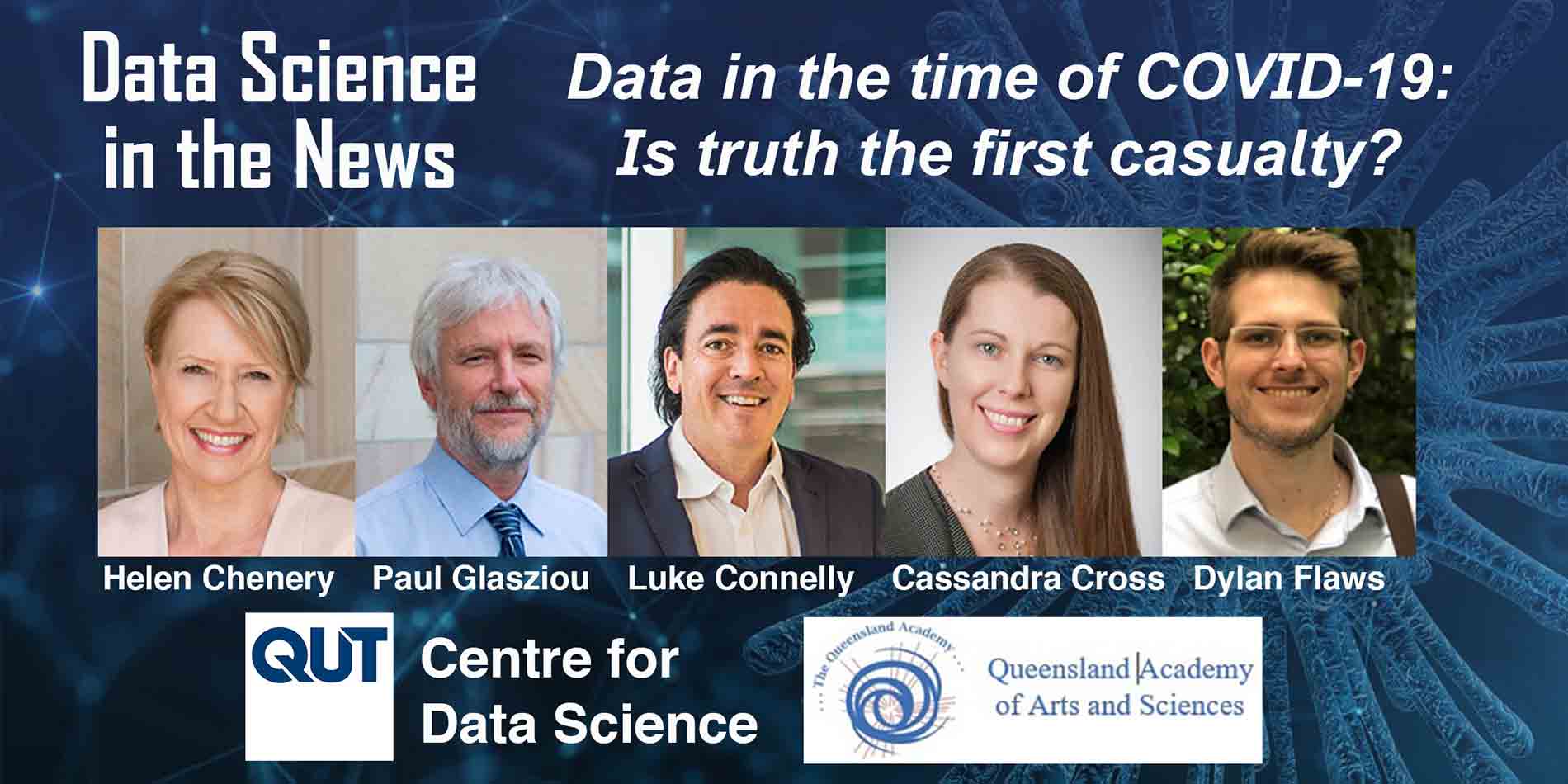Data in the time of COVID-19: Is truth the first casualty?

Data in the time of COVID-19: Is truth the first casualty?
This expert panel of researchers will share how data science can provide insights into COVID-19. This will be followed by a Q&A session.
Moderator:
Emeritus Professor Helen Chenery - President, Queensland Academy of Arts and Science.
Panellists:
Professor Paul Glasziou - Director, Institute for Evidence-Based Healthcare; Faculty of Health Sciences & Medicine, Bond University.
Dr Dylan Flaws - Associate Professor – QUT; Head of Mental Health Research – Critical Care Research Group; Psychiatry Advanced Trainee – RBWH.
Professor Luke Connelly - Centre for the Business and Economics of Health (CBEH) and Faculty of Health and Behavioural Sciences, The University of Queensland; Department of Sociology and Business Law, The University of Bologna.
Dr Cassandra Cross - Senior Research Fellow, Cybersecurity Cooperative Research Centre, Senior Lecturer, School of Justice, Queensland University of Technology.
More about the panel session topics:
Professor Paul Glasziou - The epidemiology of COVID-19
The COVID-19 pandemic has grown from 27 cases on January 1st to over 2 Million cases in 210 countries by mid-April, with around 150,000 deaths. Many countries have now started to "flatten the curve", and a few, such as Australia, have contained, but not eliminated, the epidemic - dropping from 400 new cases per day to around 40. The main strategies have been (1) test, contact trace, and track (2) international border control, and (3) social distancing measures. A vaccine is unlikely until 2021, and even then uncertain. So the key questions now are what we can do meanwhile to keep the "R" below or around 1, so that the epidemic does not re-emerge. That includes many unknowns such as the asymptomatic case rate, the duration of immunity, and the impacts of different degrees of distancing measures. The models used to inform policy make reasoned guesses at these inputs, but we urgently need research to provide better estimates to balance the need for public health intervention against the harms of lockdowns. What defines authoritative and trusted sources of epidemiological information will be discussed.
Dr Dylan Flaws - The impacts of COVID-19 on mental health: Where is the trusted information?
COVID-19 has had immediate and measurable effects on the mental health and well-being of our community. As the impacts of the pandemic continue, however, additional stressors relating to uncertainty, physical distancing and ongoing isolation are appearing. Accessing trusted information about the psychological consequences of COVID-19 and ways in which to minimise their effects is fraught, with spurious sources proposing ‘solutions’ – with little or no evidence as to their effectiveness. I will describe a process used to identify authoritative, trusted information relating to hospital staff well-being that may be impacted by the pandemic and then describe how I used this to develop an evidence-based service to meet that need. This information is broadly relevant/transferable to other workplaces and the general community.
Professor Luke Connelly - COVID-19: The Economics of Information, Risk and Uncertainty
Economists distinguish between risk and uncertainty. Risk refers to the chance of a random event occurring. Uncertainty refers to circumstances in which the chance of the event cannot be quantified. I shall discuss how both concepts are pertinent to some aspects of COVID-19 and its spread. Equally, information about the disease, its transmission and its effects is subject to a “quality uncertainty” problem. Information goods such as these may be ‘experience goods’ whose quality is impossible to judge immediately, but may become clearer with the passage of time. Alternatively, they may be ‘credence goods’, meaning that one will never be able to discern their quality completely but must consume them on trust. I shall show that these concepts are relevant to policy-related decisions about COVID-19 that may have serious health and economic consequences. Finally, individuals’ perceptions of the quality of the information they receive, along with their willingness to follow authorities’ advice (e.g., social distancing measures), may depend on their assessments of legitimacy - this is particularly so in the current COVID-19 context.
Dr Cassandra Cross - Fraud in the context of COVID-19
Fraud is premised upon lying and deception for financial advantage. While fraud is not new, technology has changed the way in which it is perpetrated and exponentially increased the number of potential victims globally. Offenders tend to tailor their approaches based on current events, and COVID-19 is no exception. This presentation summarises the techniques used by offenders to successfully defraud individuals, and highlights what to look out for in the current context of COVID-19.
